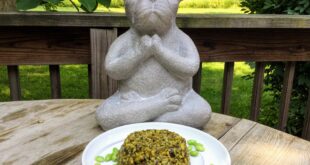
By Charles Garfield, Ph.D.
I’ve been fascinated by the way that feeling gratitude in the moment changes not only the moment, but also our relationship with past and future. It eases our way through time.
At 75, I can’t pretend that challenges and unwelcome change don’t come thick and fast at times. Friends call with news of surgeries, and death keeps shrinking my circle of dear ones. Doctors’ visits become an ever-larger part of all our routines, and the list of watched and worrisome conditions lengthens. Familiar touchstones of the past disappear—“small” things, like a beloved store or corner tree or the elderly dry cleaner whose smile was something you could count on every time you came in. Even the seasons can seem wrong—too hot or dry or cold, the very air unfamiliar, not like before. Not like before.
In later life, we can string these changes and erasures and concerns into a litany of loss, a constant state of mourning and complaint and irritation. But gratitude opens us to a way of navigating change that is expansive, uplifting, joyful.
When you look at the past with an appreciation of what you’ve loved and gratitude for the time you shared, you carry the spark of that love into the present, where it can walk in the world with you, inspire you, and keep you company, instead of taunting you with a sense of diminishment and loss.
I was at dinner with a longtime friend when his knee locked as he stood to go to the men’s room. He grimaced and eased himself up, then slowly limped away. He was grumbling when he returned—damn knee—and I knew that our conversation could easily turn into an organ recital—his knee, my hip, and our shared medley of pains and the procedures to fix them. But I wondered what it would be like to put all that aside. “Here’s a question for you,” I said. “What do you remember most about the times it served you well? You were quite a hiker weren’t you?”
“I was a hiker, and you were Pocket Hercules,” he said with
a laugh.
We started talking about what it had felt like to be strong young men and throw ourselves into joys that let us revel in our bodies. We stood back and admired those earlier versions of ourselves. We cringed a little, too. Those younger selves were competitive and certain of their immortality, yet also insecure, hiding their vulnerability behind an armor of muscles and proving their fearlessness by pushing their bodies hard. They’d rest when they were dead, they said. “We were a couple of lunkheads sometimes,” my friend said with obvious affection. Our earlier antics had put a lot of wear and tear on us, but there was nothing to regret. We stood next to the athletes we’d been, savoring their youth and feeling their raw energy. It was all there in sense memory and twined into our spirits, there to appreciate and enjoy.
That’s true of the people and places and tastes we’ve loved, the songs and stories. We keep them alive in us by recalling them not with nostalgic longing but with thanks.
I’ve found that in life-review work, gratitude can be a vehicle and tool for looking again at the dark times we’ve experienced and finding a reason for thanks or appreciation, even for what hurt us the most. In my life and in the lives of many people I’ve known, I’ve seen that some of the most important openings and growth have come from experiences that could be looked upon as reversals, losses, tragedies, or plain bad luck.
It’s not a matter of slapping on a smile and saying “make lemonade” or “look on the sunny side.” I would never ask anyone to do that. But I’ve found it revealing and productive to ask:
- Who am I now that I never would’ve been without having to face the experiences that most challenged me?
- Who or what showed me the way when I was lost or lifted me up when I felt defeated?
- What did they teach me?
- Might there be lessons and discoveries about my deeper self that I can carry forward now?
- How does my suffering connect me to those who also suffer in this world?
- And what have my most difficult experiences taught me of grace?
This is challenging work, but it eases the way for forgiveness, acceptance, and even joy.
Charles Garfield, Ph.D., is the founder of Shanti Project, an internationally honored volunteer organization dedicated to the care of the dying, the elderly, and those living with cancer and AIDS, and
the Shanti National Training Institute.
 Conscious Community Magazine Dedicated to Elevating Consciousness
Conscious Community Magazine Dedicated to Elevating Consciousness




